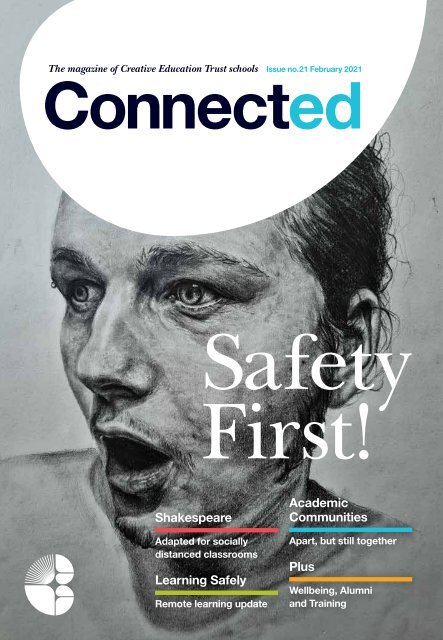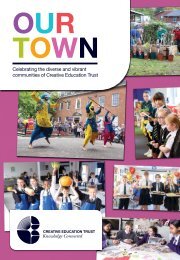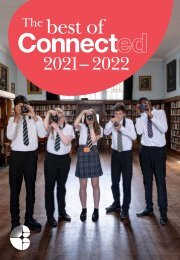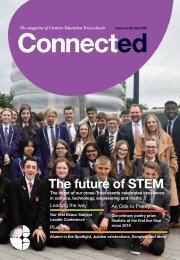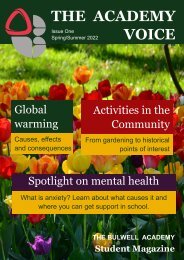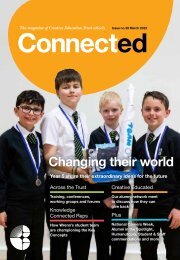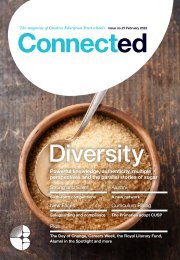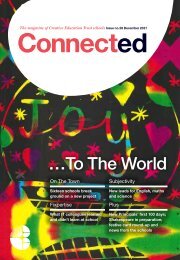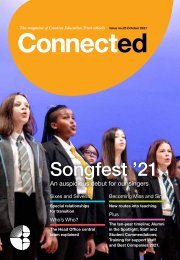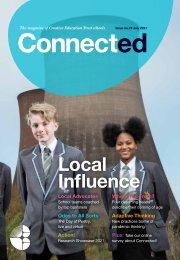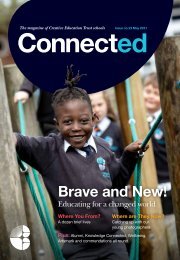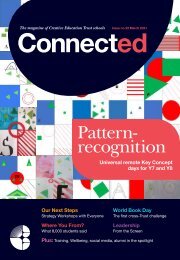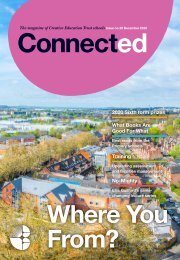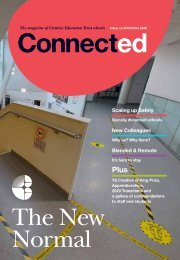Connected issue 21
The 21st issue of Connected: the magazine of Creative Education Trust schools
The 21st issue of Connected: the magazine of Creative Education Trust schools
You also want an ePaper? Increase the reach of your titles
YUMPU automatically turns print PDFs into web optimized ePapers that Google loves.
The magazine of Creative Education Trust schools Issue no.<strong>21</strong> February 20<strong>21</strong><br />
<strong>Connected</strong><br />
Safety<br />
First!<br />
Shakespeare<br />
Adapted for socially<br />
distanced classrooms<br />
Learning Safely<br />
Remote learning update<br />
Academic<br />
Communities<br />
Apart, but still together<br />
Plus<br />
Wellbeing, Alumni<br />
and Training
<strong>Connected</strong><br />
02<br />
The magazine of Creative Education Trust schools<br />
Where<br />
You<br />
From?<br />
Inspirational Iris leads the way for Bulwell<br />
“It’s nice to be recognised,<br />
but the main reason is to<br />
help the people who most<br />
need it in the community<br />
where I live.”<br />
Iris Wallace and her family moved to Bulwell<br />
only a year ago, but she’s taken the place to<br />
her heart. When lockdown came, communityminded<br />
Iris wondered what she could do to<br />
help those in need around her. Now she has<br />
been named one of The Nottingham Building<br />
Society’s Innovative Young People of 2020.<br />
Bulwell Forest Garden is a community food growing<br />
project with a regular timetable of events and<br />
workshops for local residents. It aims to support the<br />
health and wellbeing of people of all ages through<br />
education, environmental play and, of course, plenty<br />
of organically grown fruit and vegetables. Iris, who<br />
is 11, spends several hours a week at the garden,<br />
undertaking disparate tasks from fundraising to<br />
litter-picking and making bird feeders, alongside<br />
tending to the plots and the community orchard.<br />
Iris also volunteers at Bestwood and Bulwell Food<br />
Bank putting together vital food parcels. Just before<br />
Christmas she supported her mums Kelly and Shelly<br />
in cooking more than 250 hot meals for families in<br />
need over a two-week period.<br />
Set up as a mutual society in 1849 by a Quaker<br />
businessman, school founder and abolitionist named<br />
John Fox, The Nottingham is a prominent local<br />
building society. It established the Young People’s<br />
award to shine a light on young people who have<br />
found inspiring ways to further their education or<br />
boost their career aspirations. One of Iris’ fellow<br />
community gardeners, Adele Brooksbank – also a<br />
trustee of the food bank - saw an opportunity to<br />
reward Iris’ outstanding commitment to vulnerable<br />
community members. Ms Brooksbank said she<br />
nominated Iris “not just because she has helped us<br />
in the garden, but because she has overcome<br />
her own shyness and continues to look for new ways<br />
of learning and gathering information.” As it turned<br />
out, 19 other people from in and around Bulwell<br />
also nominated Iris for her extraordinary efforts!<br />
Issue no.<strong>21</strong><br />
February 20<strong>21</strong><br />
Where You From?<br />
Extra!<br />
03<br />
Creative Education Trust pupils go to school across<br />
England in areas that are unique, historical, modern<br />
and different in ways that only the people who live<br />
there can know about.<br />
They might live by the sea, in a town or in a city.<br />
They and their parents come from all over the world<br />
and they may have lived in more than one place.<br />
In order to develop new cross-Trust creative projects<br />
that celebrate these unique communities and places<br />
of belonging, the Programmes team <strong>issue</strong>d a survey<br />
to establish a baseline of perceptions among<br />
secondary school pupils about where they’re from<br />
and how they feel about it.<br />
As the survey closes, <strong>Connected</strong> can report that<br />
although 78% of respondents tend to agree that<br />
where they come from gives them advantages, and<br />
60% feel more positive about where they come from<br />
than they did before Covid-19, the overwhelming<br />
majority – almost eighty percent – don’t think it<br />
actually matters where you’re from. We hope this<br />
is because they have such confidence that their<br />
education will serve them well!<br />
“I am more positive about the place I live<br />
now than I was before the Covid pandemic.”<br />
Agree<br />
27%<br />
Somewhat<br />
agree<br />
33%<br />
Disagree<br />
20%<br />
Somewhat<br />
disagree<br />
20%<br />
Iris won the 11-13 years category and took home<br />
a £250 tech voucher prize. Her dedication to<br />
helping those in need remains unclouded by this<br />
public recognition: “It is nice to be recognised in<br />
this way but the main reason I continue to do as<br />
much volunteering as I can in my spare time is to<br />
help people who most need it in the community<br />
where I live.”<br />
Creative Education Trust joins Michelle Strong,<br />
Principal of Bulwell, and all of Iris’ schoolmates<br />
in congratulating her on the award.
04<br />
<strong>Connected</strong><br />
The magazine of Creative Education Trust schools<br />
Academic Communities<br />
Issue no.<strong>21</strong><br />
February 20<strong>21</strong><br />
05<br />
The introduction of Academic Communities arises<br />
from Creative Education Trust’s strategic goal of<br />
securing direct and positive impact on our children<br />
by developing people and their talents. This goal<br />
is reflected in both the Education and the Human<br />
Resources Action Plans, and is an enactment of<br />
the observation articulated by Professor William<br />
Richardson, Chair of the Education Standards<br />
Committee, in his 2019 discussion paper, Academy<br />
Schools in England’s Deprived and ‘Left Behind’<br />
Communities:<br />
“Although often taken for granted and consequently<br />
neglected, schooling is fundamentally a process of<br />
relationships and thus highly people intensive. Because<br />
the crucial people dynamic within a school is that of<br />
relationships between adults in authority and children<br />
under tutelage, the calibre of a school’s staff goes<br />
most of the way to determining the calibre of the<br />
school as this is experienced by each child.”<br />
Harvard professor Linda Hill, co-author of Collective<br />
Genius, has studied some of the world's most creative<br />
environments for approaches to keeping great ideas<br />
flowing, from everyone in an organisation: “Working<br />
closely together is one way to unlock our creativity and<br />
give every great idea a chance.” As a Trust, we have<br />
used the past 6 months to turn ambitions like these into<br />
reality. By Christmas of 2020, our existing collaborative<br />
networking groups have been formalised, and a number<br />
of others have been created with a view to supporting<br />
colleagues with structured and regular opportunities<br />
to enhance their curriculum offers, share challenges,<br />
creatively design solutions, moderate and standardise.<br />
“In this <strong>issue</strong>, we can<br />
update readers that twenty<br />
Academic Communities<br />
are now up-and-running.”<br />
We’ve written before about these aspirations and, in<br />
this <strong>issue</strong>, we can update readers that twenty Academic<br />
Communities are now up-and-running, each with a specialist<br />
Chairperson and a newly-designed electronic platform:<br />
from secondary and post-16 subject specialisms, to CEIAG,<br />
PSHCE, SEND and Initial Teacher Training. While the activity<br />
and impact of these groups is overseen by Gwayne Webb as<br />
Director of Learning and Teaching, they are further supported<br />
by Wrenn Vice Principal Nimish Lad in his leadership capacity<br />
on curriculum development and research. Our newlyappointed<br />
School Improvement Coordinator will support the<br />
administrative requirements of these collaborative interactions.<br />
The inaugural meetings held in December and January<br />
revealed real appetite for closer-working opportunities of this<br />
kind. Teams are devising agenda items that will accelerate<br />
the pace of their planning and increase the rate at which<br />
their efforts directly and positively impact on the educational<br />
experiences of our students – and their outcomes. <strong>Connected</strong><br />
caught up with some of the specialists who are chairing<br />
Communities, who had this to say:<br />
When Marc Jordan first<br />
addressed the staff<br />
of Weavers in 2013,<br />
my thoughts were<br />
immediately drawn to<br />
the possibilities of our<br />
collected expertise<br />
and contacts. We’ve<br />
navigated the present<br />
challenges as teams<br />
with a military precision<br />
and shown that when<br />
we work collaboratively<br />
anything is possible:<br />
blended learning and<br />
virtual live lessons,<br />
secure IT provision<br />
released to thousands of young people, critical<br />
support for our vulnerable students, the administration<br />
of lateral flow testing, devising and reviewing risk<br />
assessment after risk assessment. Years of work within<br />
the Trust have brought<br />
us to this point and I’m<br />
the proud Chair of the<br />
Academic Community<br />
for Post-16 Provision.<br />
The platform to really<br />
achieve something<br />
exciting for thousands<br />
of young people<br />
is now established.<br />
Magnus Wallace,<br />
Weavers<br />
The Mentoring<br />
Community I<br />
chair will support<br />
mentors to<br />
provide a positive<br />
induction into<br />
their trainee<br />
teachers’ chosen<br />
career, building<br />
their resilience<br />
from the start.<br />
Collaboration feels<br />
more powerful<br />
than ever now<br />
that we’re so isolated in our teaching and our schools.<br />
Each of us is in the same role with the same priorities,<br />
but the Community is one step removed from the<br />
inner workings of our schools. It gives us an important<br />
opportunity to think critically about our professional<br />
practice, and to think beyond the immediate<br />
pragmatics about how to apply the Creative Education<br />
Trust vision in our own settings.<br />
Georgina Spencer, Wrenn<br />
In the current pandemic, it is even more important that we share innovative ideas<br />
for growing our students into well-rounded young thinkers through our teaching.<br />
The Academic Community for maths is building enthusiasm and a passion for<br />
mathematics across the Trust, enabling students to enjoy the subject so that they<br />
become confident mathematicians.<br />
Jodie Green, Hart School<br />
Working alongside an inspirational group of<br />
science leaders has been amazing and I was<br />
thrilled to be offered the Chair of our Academic<br />
Community. I envisage it as a centralised<br />
catalyst for relationships as result of different<br />
needs and interests, and as a showcase for<br />
developments. It’s a superb platform for all the<br />
schools in the Trust to have a voice, to face<br />
challenges together and have greater impact<br />
on the progress of our students.<br />
Sarah Golley, Wrenn<br />
I want to share my vision for the future as Chair of the<br />
English Academic Community. Now more than ever,<br />
we need to utilise the relationships we’ve formed to<br />
guarantee the same level of teaching and learning<br />
for students across our Trust. The Community will<br />
support teachers with resources and materials and<br />
will ensure the assessments and data are robust,<br />
fair, and trustworthy through careful monitoring and<br />
moderation. Additionally, we’ll keep an eye on training<br />
and recent research from external bodies on behalf of<br />
all the schools as we align and embed the new English<br />
curriculum.<br />
Heidi Crawley, Wrenn<br />
There’s more to come! Over the course of this new<br />
Spring term, the Education Team has been working<br />
closely with leaders across the schools to add<br />
Communities, not only for the remaining subjects but<br />
also for complex but crucial areas of focus such as<br />
behaviour, learning and teaching,<br />
attendance and pupil premium.<br />
The ambition is to create an<br />
additional ten Communities by<br />
Easter. The editorial team will<br />
make sure we keep readers<br />
abreast of the impact of this<br />
important initiative for the Creative<br />
Education workforce.
06<br />
<strong>Connected</strong><br />
The magazine of Creative Education Trust schools<br />
Sitting Safely<br />
Now that the progress of Covid-19 has locked<br />
many colleagues down again as home-workers,<br />
the HR team would like to remind everyone<br />
of the importance of a healthy workstation.<br />
Creative Education Trust’s guidance and risk<br />
assessment for homeworking is available here,<br />
and this is the list of ingredients for a healthy<br />
set-up to work from home:<br />
• A suitable table or desk<br />
• A suitable chair with a well supported back<br />
• A desk set-up that reduces the need to twist,<br />
turn and lean<br />
• Adequate lighting<br />
• Suitable temperature<br />
and humidity levels<br />
• A separate mouse,<br />
keyboard and screen<br />
NEW!<br />
Rental<br />
Deposit Loan<br />
Scheme<br />
We’re pleased to announce<br />
the introduction of a new<br />
benefit to assist staff in rented<br />
accommodation. We know how<br />
difficult it can be to find the<br />
deposit for your first rental, or to<br />
move from an existing property<br />
when the landlord will not return the<br />
deposit until after you leave.<br />
This new policy is designed to help.<br />
It enables you to have a salary advance for<br />
the deposit and repay the loan over an agreed period.<br />
Certain criteria that need to be met are contained in the<br />
full policy, available here:<br />
cetcloud.org.uk/policies<br />
Safe<br />
Screens<br />
Issue no.<strong>21</strong><br />
February 20<strong>21</strong><br />
In addition, advice is available here on minimising the risk of<br />
strain from the prolonged use of Display Screen Equipment<br />
• Taking frequent short breaks<br />
• Changing your posture as frequently as possible<br />
• Assuming a more comfortable position<br />
• Adjusting your keyboard to get<br />
a good keying in position<br />
• Positioning your mouse within<br />
easy reach<br />
• Adjusting the brightness and<br />
contrast on your screen<br />
HEALTH<br />
WARNING<br />
Please note that although<br />
all the illustrations are<br />
authentic, not all of them<br />
are exemplary!<br />
NEW!<br />
The Creative<br />
Education Trust<br />
Staff Handbook<br />
here<br />
In the current climate, many external, ‘feel-good’<br />
solutions we depend on aren’t easy to come by.<br />
Dena Smart, Director of HR, dusts off her old<br />
Neurolinguistic Programming course to share<br />
some cheering principles with Creative Education<br />
Trust colleagues.<br />
Ever heard of Neuro Linguistic Programming? Most people<br />
will answer ‘no’, but might be surprised to find that they’ve<br />
learned a lot of NLP things in coaching, personal<br />
development and even weight loss programmes.<br />
Developed in the 1970s by Richard Bandler and John Grinder<br />
in the USA, NLP is a theory of communication that brings<br />
together neurological processes, language and behavioural<br />
patterns. Its effectiveness has mixed scientific reviews –<br />
Wikipedia classifies it at ‘pseudoscientific’ – but having<br />
studied it in the 1990s, I definitely think it has something<br />
to offer us now.<br />
My back story is that I am an only child from a low-income<br />
family and my father was a fairly volatile alcoholic. This<br />
meant that as a child I became watchful of human behaviour<br />
and proficient in ‘reading the mood’. No surprise that my<br />
first degree was psychology. NLP interested me because it<br />
brought together brain and behaviour and, while some of the<br />
things I was taught were borderline cultish, other ideas were<br />
really helpful and I’ve come across them packaged<br />
in many different ways and fields since.<br />
My 30-year old daughter recently told me she’d started<br />
‘manifesting’. Apparently this is very current – Vogue.co.uk<br />
defines manifestation as “the materialisation of a thought or<br />
belief into physical form, based on the idea that our mind is a<br />
powerful tool for creation”. I brushed off my old NLP manual<br />
and, together, we found many similarities. You might recognise<br />
some of these, and with practice and thought they can really<br />
make a difference to how you feel:<br />
01<br />
02<br />
Positive outcomes<br />
Don’t focus on what you don’t want; instead,<br />
really try to imagine what you do want.<br />
Be aware of beliefs that<br />
limit you<br />
‘I could never….’, for example – and question whether<br />
they’re true.<br />
03<br />
It’s easier to change the map<br />
than to change the outside<br />
world<br />
We create maps, or diagrammatic representations, of reality<br />
from our sensory experiences, then operate and communicate<br />
from the maps we have created. Everyone’s map is different,<br />
and many human problems are caused by the maps in our<br />
heads, but you can change the map.<br />
04<br />
If you keep<br />
doing what<br />
you’ve always done,<br />
you’ll keep getting<br />
what you've<br />
always got<br />
If what you're doing isn't<br />
working, do anything else! It is<br />
easier to change your own behaviour than other people's.<br />
05<br />
Every experience is an<br />
unprecedented opportunity<br />
to learn<br />
There is no failure, only feedback; no mistakes, only results;<br />
no errors, only learning.<br />
06<br />
The person with the greatest<br />
flexibility of thought and<br />
behaviour can control the outcome<br />
of any interaction<br />
Excellence comes from having many choices; and<br />
wisdom from multiple perspectives.<br />
07<br />
It is not what happens to you<br />
that makes the difference;<br />
it's what you do with what happens<br />
to you.<br />
08<br />
You cannot not<br />
communicate<br />
Even if you say nothing, 93% of<br />
communication is nonverbal; so be<br />
conscious of your impact.<br />
09<br />
There’s a positive<br />
intention behind<br />
all human behaviour<br />
Identify the positive intention behind<br />
each of your interactions with others,<br />
and be aware that the way you behave<br />
may not represent your positive intention<br />
successfully.<br />
Many avenues of support for positive<br />
mental health are available online and<br />
through the webinars on the Health<br />
Assured EAP portal (username;<br />
creative password: education) to<br />
which all Creative Education Trust<br />
employees have access.<br />
Dena recommnends The Art of Possibility<br />
by Rosamund Stone Zander and<br />
Benjamin Zander for a real shift<br />
in thinking.<br />
Wellbeing
<strong>Connected</strong><br />
08<br />
Safe<br />
The magazine of Creative Education Trust schools<br />
Creative Education Trust’s annual<br />
Shakespeare project moves online<br />
Shakespeare<br />
The annual Days of Shakespeare have become<br />
treasured in the Trust calendar since their launch in 2014.<br />
But with last year’s challenges, and more anticipated this<br />
year, the Programmes team were cautious about proposing<br />
Shakespeare 2020. We discovered that you cannot stop<br />
our teachers’ or students’ appetites for performance!<br />
Schools were <strong>issue</strong>d with guidelines, masterminded by our<br />
partners HMDT Music, for a project modified for classroom<br />
(rather than stage) and remote delivery, and a set of brandnew<br />
resources to work with. The result? An astonishing 375<br />
students participating across seven secondary schools:<br />
performing dramatic scenes, writing their own drama and<br />
making artwork inspired by the Bard.<br />
Experts online<br />
In previous years, students have had a wonderful encounter<br />
with two visiting professionals: a voice coach, and a theatre<br />
designer. This year students and their teachers have had<br />
a choice of nine virtual masterclasses from five creative<br />
professionals.<br />
Theatre Director Katie Lewis, who learned her skills<br />
at the Royal Shakespeare Company, presented films<br />
on five core rehearsal skills: exploring Shakespeare’s<br />
language; performing verse; ‘actioning’ feelings or ideas;<br />
characterisation; and improvisation. To expand the creative<br />
ways for students to engage with Shakespeare’s texts,<br />
four additional films were <strong>issue</strong>d: designing for the theatre;<br />
illustration; photography; and typography for film. In each,<br />
a creative professional gives an insight into their career and<br />
working processes, and set activities for the students to try<br />
Above: Two of the video masterclasses: Theatre Director Katie Lewis<br />
reveals the secret of verse; and a crash course in experimenting with<br />
typography from graphic designer and illustrator Seonaid Mackay.<br />
out for themselves. Students submitted their artwork along<br />
with their original scipts and filmed performances, to share<br />
with other schools.<br />
Laura Marriott, Head of Drama at Weavers, said her students<br />
were “brilliant participating in the online activities and they<br />
especially loved Katie Lewis’s Iambic Pentameter course.<br />
They produced some wonderful work and practised with<br />
independence and enthusiasm.”<br />
Year 9 Lynn Grove,<br />
performing a reimagined<br />
scene: the doctors treating<br />
Lady Macbeth’s madness<br />
now discussing the<br />
Covid-19 pandemic<br />
Lockdown themes<br />
For the 2020 edition of our Shakespeare project, we<br />
<strong>issue</strong>d a set of excerpts for one, two or a small group of<br />
performers, each responding to a key theme of lockdown<br />
experiences: familial tension, loneliness, constrained liberty,<br />
and so on.<br />
Olivia, a Year 10 student at Abbeyfield, observed analogies<br />
for Romeo and Juliet among people in new relationships,<br />
likening the government lockdown to the patriarchal<br />
impositions of the Montague and Capulet families. “People<br />
who’ve fallen in love during lockdown have been forbidden<br />
to meet, only able to meet up outside”, she pointed out.<br />
Some students reflected on Shakespeare through<br />
their own creative writing. This led to some wonderful<br />
inventions, including Lynn Grove students Ashleigh<br />
Barby’s and Hannah Didman’s reimagining of the scene<br />
in which the doctor gives support to Lady Macbeth as a<br />
comment on the 2020 pandemic. Ashleigh commented<br />
on the unforeseen benefit of editing Shakespeare’s text to<br />
modernise it: “I’ve learnt to appreciate still-acting more –<br />
how to let the words and mannerisms portray the character<br />
without physically doing a large amount.” A group of Year<br />
8 Hart students penned a letter from The Taming of the<br />
Shrew’s Baptista to an agony aunt. Seeking advice on how<br />
to tame his rebellious daughter Katherine and calm her<br />
younger sister Bianca, he pleads: “What can you do to help<br />
me? I'm really struggling with<br />
these silly girls. I love them very<br />
much, but they really need to<br />
give it a rest.”<br />
A costume for Juliet, made by<br />
Loredana, Year 10 Weavers<br />
Lady Macbeth costume design,<br />
Lily, Year 10 Weavers<br />
Sharing the work<br />
Issue no.<strong>21</strong><br />
February 20<strong>21</strong><br />
A film featuring work from all participating schools has<br />
been put together so that everyone can enjoy each other’s<br />
performances: online and available to watch here:<br />
knowledgeconnected.org.uk/<br />
Shakespeare2020<br />
Tyrone, Year 10 Ellis<br />
Guilford, as Hamlet<br />
Year 8 Ash Green<br />
students show<br />
their Shakespeare<br />
set designs<br />
Set designs and models for Romeo and Juliet, Year 10 Abbeyfield<br />
James as King Lear and Michael as The Fool,<br />
Year 9 Caister<br />
09
10<br />
<strong>Connected</strong><br />
The magazine of Creative Education Trust schools<br />
Issue no.<strong>21</strong><br />
February 20<strong>21</strong><br />
11<br />
ALUMNI<br />
Liam in the title role<br />
of Thistley Hough’s<br />
Macbeth in 2014<br />
Liam performing in<br />
Academy Christmas,<br />
2017<br />
IN THE<br />
SPOTLIGHT<br />
In September 2011, Creative Education Trust began<br />
operation as the sponsor of its first schools in Rugeley.<br />
To mark the tenth anniversary this year, <strong>Connected</strong> will<br />
interview an alumnus or alumna in every <strong>issue</strong>. We begin<br />
with Liam Tiesteel, who starred as Macbeth in the first<br />
Day of Shakespeare in 2014. Now in his final year at<br />
Laine Theatre Arts college in London, Liam fills us in<br />
on the five years since he left Thistley Hough.<br />
days before leaving for Laines, Liam received even more good<br />
news. He discovered that he was one of four students selected<br />
each year to be awarded a full scholarship for his course, which<br />
“changed my life forever”.<br />
Liam felt he had two main options after completing GCSEs;<br />
either to study A levels or to go straight into acting. With a<br />
passion for drama and encouragement from his teachers,<br />
Liam chose to join a specialist Performing Arts college in<br />
Bradwell for a Level 3 BTEC. He describes the experience as<br />
a “huge change”, as it was such a physical course and he was<br />
suddenly with “all the best performing arts students across<br />
Stoke”, many of whom already had lots of experience of<br />
dancing and singing. However, Liam’s commitment clearly paid<br />
off as he went on to interview at all the big London institutions<br />
for acting, securing places everywhere he auditioned before<br />
selecting Laines.<br />
Getting into Laines has been Liam’s highlight since leaving<br />
school. “It was amazing to go where so many well-known<br />
actresses and actors had trained...It felt like my whole life had<br />
led up to this, pursuing my dream”. Liam named Charlie Stemp<br />
as one of his biggest inspirations; a Laines graduate who has<br />
gone on to work on Broadway and in the West End. A few<br />
Liam has now secured his first professional acting roles,<br />
including a recent performance in the pantomime Rapunzel.<br />
Liam talks about how Thistley Hough provided “such a good<br />
foundation for where I am now”. Whilst at Thistley Hough,<br />
Liam’s teachers said that he had a natural ability for drama, and<br />
that he “was born to be on stage”. Liam took part in Creative<br />
Education Trust’s Shakespeare project in 2014, playing the lead<br />
as Macbeth. In addition to this role, he was involved in a range<br />
of showcases, variety shows, and events. Liam describes his<br />
time since year 11 as a “massive journey”, working towards his<br />
professional career.<br />
Liam shared how he received excellent support from Thistley<br />
Hough staff; “The teachers all made time for us. We were all<br />
individuals to them, not just a student in their class. I had great<br />
connections with my teachers; they really understood me<br />
and what I wanted to do”. Liam credits his History teacher Mr<br />
Bate in particular, as Mr Bate encouraged him to take part in<br />
workshops and explore his interest further by auditioning with<br />
an amateur group.<br />
Liam’s advice for current students considering their options<br />
after school is to “go for what you feel you want to do, not<br />
what you think you ‘should’ do. If you are passionate about<br />
something, it will make you work harder until you get that<br />
course or job you wanted. There are opportunities in every<br />
industry, it’s just about finding them”.
12<br />
<strong>Connected</strong><br />
The magazine of Creative Education Trust schools<br />
Successes and special<br />
commendations<br />
Students…<br />
To Oskar Niewiem, year 9 at Bulwell,<br />
who’s been offered a contract with<br />
Nottingham Forest Football Club.<br />
To Ethan Bucknall, year 11<br />
at Bulwell, for being named a<br />
Nottingham Clean Champion and<br />
keeping his community clean,<br />
and inspiring others to help out.<br />
To Anya Tregay, year 13, who<br />
received an offer to study Law<br />
at Hertford College, Oxford from<br />
September 20<strong>21</strong> and made<br />
history as the first Hart student<br />
to receive an Oxbridge offer.<br />
School, community and town<br />
are proud!<br />
Issue no.<strong>21</strong><br />
February 20<strong>21</strong><br />
13<br />
…and<br />
staff<br />
To Aran Dharmaraj at Harpfield, for<br />
completing his grade 2 drums with 85%<br />
just before Christmas.<br />
To Lewis Ashdown, Caister year 11, awarded<br />
the school’s first Beauchamp award for courage of<br />
character in recognition of his tireless study and for<br />
his support to the community of students and staff.<br />
To Paul Knighton and the Ellis Guilford team,<br />
for launching a cooking show with brilliant recipes<br />
using ingredients from Free School Meal hampers.<br />
To Katelen Lacey, year 9<br />
at Caister, commended<br />
by Hama Beads UK on<br />
their official Facebook page<br />
after spending 3 months<br />
and 80,000 Hamma Beads<br />
creating a piece of artwork<br />
of her family.<br />
To Sanjita Kurasala, year 10, (submission left) and Matilda<br />
Wright, year 8 (submission right) at Abbeyfield, winners<br />
respectively in the Modern Life and Light thematic categories<br />
of the University of Northampton’s photography project.<br />
To Kitty Allsopp, year 11 at Bulwell, who loves to write and<br />
shared the poem Shower online.<br />
Shower.<br />
As the water pummels unforgivably down your head,<br />
Down your face, down the mindless body.<br />
It races to the drain,<br />
like a race to win before the tears win themselves,<br />
Or is it the fact that even the pure water that cleans your soul<br />
Cannot clean your thoughts? so it tries to escape from the<br />
thought of even trying to.<br />
Now you've lost.<br />
Steam. It fogs the curtain, it fogs your eyes just like the end is<br />
just not quite clear in sight. Like it always had been not;<br />
getting clearer when you want it to.<br />
You pray that the water will wash away the pain or at least;<br />
warm your body like that feeling you once had.<br />
You thought that at least a shower was going to make some<br />
sort of sense,<br />
Or help with the flood of thoughts, with the fog in your mind,<br />
with the slight odour of your skin or tumbling head.<br />
But it doesn't.<br />
Kitty Allsopp, Year 11<br />
To Jemma Adlington,<br />
praised by colleagues for<br />
her seamless transition<br />
to the leadership of<br />
Harpfield Primary.<br />
To Ms McAdam at Caister,<br />
'highly commended' in<br />
the Gratnells (technical<br />
suppliers) award for Science<br />
Technican of the Year.<br />
To Jess Delf, English<br />
teacher, who coordinated<br />
the donations of Caister<br />
parents, staff and students<br />
to the Great Yarmouth<br />
Salvation Army food bank,<br />
so substantial that it<br />
required several<br />
trips to deliver!
14<br />
<strong>Connected</strong><br />
The magazine of Creative Education Trust schools<br />
Issue no.<strong>21</strong><br />
February 20<strong>21</strong><br />
15<br />
Becoming<br />
a Teacher<br />
in the 2020s<br />
It is fair to say that like everything else, the Initial Teacher Training landscape<br />
has not gone unaffected by the pandemic. While national providers and<br />
the Department for Education continue to respond and adapt to the uncertain<br />
times, Creative Education Trust has not been standing still in our determination<br />
to attract early-career professionals. For the general interest of <strong>Connected</strong><br />
readers – and for any who might be thinking of becoming a teacher –<br />
Gwayne Webb, Director of Learning and Teaching, expounds the options.<br />
Prospective teachers need to be working towards a degree<br />
with GCSE grade C/4 in English and maths – plus, for primary<br />
trainees, a science subject. There are degrees with automatic<br />
Qualified Teacher status and others with opt-in Qualified<br />
Teacher status. There are also ways for people who already<br />
have an unrelated degree, but studied the subject they want<br />
to teach to A level, to build or refresh their knowledge before<br />
starting primary or secondary teacher training.<br />
Traditionally, and still today, there are 5 main routes to<br />
consider:<br />
01<br />
Postgraduate Certificate in<br />
Education (PGCE)<br />
PGCE programmes combine academic<br />
study with a minimum of 24 weeks on<br />
school placements. The qualification<br />
costs up to £9250, and you will not<br />
receive a salary while studying. Training<br />
takes one year and there is public and<br />
private funding available.<br />
02<br />
School Direct<br />
(fee-funded)<br />
Also costing up to £9250 and also not<br />
paying a salary, funding is available for<br />
the one-year School Direct (fee-funded)<br />
training programmes in which you learn<br />
on the job while you work towards your<br />
Qualified Teacher Status. You’ll be based<br />
in a school, but you won’t be employed<br />
by them. Alongside your practical<br />
teaching you’ll be taught by the<br />
university, college, or school-centred<br />
initial teacher training provider (SCITT)<br />
that your training school partners with.<br />
Training<br />
03<br />
School<br />
Direct<br />
(salaried)<br />
You won’t pay tuition fees<br />
for this one-year course,<br />
and you’ll earn a salary. On<br />
a School Direct (salaried)<br />
programme, you’ll be employed by a school as an<br />
unqualified teacher while you work towards your<br />
Qualified Teacher Status. This route typically<br />
requires three years of transferable work history.<br />
04<br />
Postgraduate Teaching<br />
Apprenticeship<br />
In this scheme, you’ll be employed by a school and learn<br />
to teach while you’re working. You’ll split your time<br />
between school and university study, with at least 20%<br />
of your time studying. You won’t pay tuition fees and<br />
you will receive a salary.<br />
05<br />
Teach First<br />
The Teach First Leadership Development<br />
Programme is a two-year salaried<br />
programme that combines leadership development<br />
with teacher training, and focuses on training university<br />
graduates to teach in challenging schools. There are<br />
no tuition fees. You’ll earn and learn on the job while<br />
you work towards Qualified Teacher Status and a<br />
Postgraduate Diploma in Education (PGDE). A PGDE<br />
is similar to a PGCE, but contains up to 120 credits at<br />
masters degree level.<br />
Schools Direct and Warwick<br />
University<br />
Meanwhile, here at Creative Education Trust, we recognise<br />
that attracting good trainee teachers needs secure<br />
relationships with top-quality training providers.<br />
Our exciting Initial Teacher Training (ITT) partnership<br />
with University of Warwick was ratified in the summer<br />
and we’re now able to offer Schools Direct placements<br />
from September 20<strong>21</strong> at Ash Green (our Lead School),<br />
Abbeyfield, Weavers, Wrenn and Milton Keynes. We’re<br />
recruiting for eight secondary subjects and the provisional<br />
number of trainee teacher placements has been accepted.<br />
Our adverts are live on the DfE website.<br />
The HR and Education teams have had training from<br />
Warwick and we’re working closely with our contacts<br />
there on marketing the courses, recruitment, mentor<br />
training and development. The Warwick School Direct<br />
Alliance expects that specific events are scheduled<br />
throughout the course of the year; ‘alliance days’, for<br />
example, hosted within our group of schools.<br />
We’ve established an Academic Community (see the<br />
feature in this <strong>issue</strong>) to enhance the tutoring and mentoring<br />
of our early-career colleagues under the leadership of<br />
George Spencer, Wrenn’s ITT Coordinator.<br />
Readers who are interested in getting into teaching can<br />
receive support and advice from the Department for<br />
Education. By registering with them, prospective teachers<br />
will get tailored advice, help preparing their applications<br />
and assistance with securing school experience.<br />
You can register for the service by calling 0800 389 2500.<br />
Lockdown<br />
Lessons<br />
Ofsted has shared its suggested<br />
definitions of blended and remote<br />
learning, while the Department for<br />
Education strives to define best practice<br />
against the clock of young people’s<br />
school years. As schools in the frontline<br />
embarked rather suddenly on a second<br />
period of school closure, Alison<br />
Mobbs, Chair of the Edutech Academic<br />
Community, reported on the steep and<br />
fast learning curve for remote delivery.<br />
We have a lot to be proud of. The experiences<br />
we all gathered in meeting the needs of selfisolating<br />
children during the autumn term have<br />
strengthened our practice and benefit staff<br />
and students now. Complete ‘remote education<br />
for all’ still demands a significant gear shift<br />
and some marked innovation, so it’s early days,<br />
but this article samples the ideas that are<br />
going well.
16<br />
<strong>Connected</strong><br />
The magazine of Creative Education Trust schools<br />
Issue no.<strong>21</strong><br />
February 20<strong>21</strong><br />
17<br />
At Caister, Emma Ingham explains the aim of giving<br />
teachers, teaching-assistants and all ‘student-facing’ staff<br />
access to bespoke remote learning training; not ‘one size fits<br />
all’, but an approach that began with an evaluation of each<br />
individual’s proficiency in the use of Microsoft Teams. With<br />
the self-audit of skills in place, colleagues identified their<br />
personal training needs, ranging from the basics - such as<br />
using the right meeting settings – to the more advanced skill<br />
of building assessment rubrics into student assignments. A<br />
series of ‘how to' videos was tailored to guide each person<br />
through the technical expertise they would need in each<br />
element of live lesson delivery.<br />
“Collaborative planning has also been a real driving force<br />
in the success of our provision” Miss Ingham adds; “it’s<br />
been especially purposeful in adapting lesson resources<br />
for live delivery”. The Caister team identified a list of key<br />
determinants of student engagement – visual cues, specific<br />
time reminders, numbered verb-driven instructions, clear<br />
success criteria and ‘chunked’ content – and embedded<br />
these in resources that support each lesson. Colleagues<br />
across all curriculum areas shared best practice to galvanise<br />
more of the same: “the most innovative and purposeful<br />
examples are replicated and boost everyone’s competency<br />
in the process! Our students now have consistent access<br />
to high-quality resources that are strategically designed to<br />
support them”.<br />
At Thistley Hough, Jacob Axton reported on colleagues’<br />
experiments to find the best way of delivering prolonged,<br />
pre-recorded lessons. “One ingenious idea has been to<br />
invite students to stop and immediately restart the video<br />
recording at important points in the lesson; that way pupils<br />
can easily skip straight to sections they want to recap.<br />
Other teachers have just been time-stamping their videos<br />
so the pupils know at what time certain parts of the lesson<br />
took place.” The science department are trialling the use of<br />
graphics tablets while teaching online to improve the quality<br />
of annotating diagrams, concepts or models they are trying<br />
to explain.This has been a big success for the teachers and<br />
pupils alike. Others have found the breakout rooms function<br />
useful in facilitating group work and discussion.<br />
More widely, there’s no doubt that teachers have stepped<br />
up resourcefully to the challenge of adapting Teams (which,<br />
after all, was not developed with education in mind) to<br />
create an online classroom experience. In contrast to the<br />
last period of closure schools are now live streaming lessons<br />
more regularly, and certainly Lynn Grove pupils are able<br />
follow their normal timetable of lessons with their usual<br />
teachers.<br />
As schools have adopted a more consistent approach to<br />
live lessons, engagement has improved considerably. One<br />
of the challenges we now face is how to provide more<br />
variety and sustain that engagement. Weavers has been<br />
experimenting with break out rooms for group work, as<br />
Sally Birkby reports. “Initially we timetabled two staff for<br />
each live lesson; one to teach the lesson and the other to<br />
support by answering questions using the chat function.<br />
While this had some success, student feedback showed<br />
that some students needed more examples, or just a little<br />
more time, while others were ready to move on. Acutely<br />
aware of the need to support, but not slow the pace for the<br />
whole class, the breakout rooms are proving useful. Some<br />
classes are set up to allow a teacher with a visualiser to model<br />
a few more examples, or to catch-up students identified as<br />
behind, and any student can re-join the class when they’re<br />
confident with the topic. The breakout rooms can be closed<br />
at any point in the lesson or opened up again to get those<br />
focussed groups back. Student feedback tells us engagement<br />
is increased, so has confidence, and that the experience is<br />
more personalised”.<br />
The administrative burden of remote teaching and learning can<br />
be intense, as the normal systems are not well adapted. Hats<br />
off to Abbeyfield, where Joanna Grant explains that staff there<br />
have developed a Teams app that takes care of registration.<br />
“It saves hours of admin time, so staff can expend less effort<br />
on collecting the information and more on dealing with pupils<br />
who – for whatever reason – are not managing to engage<br />
with remote learning. It’s great to see that other schools have<br />
adopted the app and will also be able to streamline their<br />
attendance reporting”.<br />
Ellis Guilford wanted a set of extra-curricular activities that<br />
were creative and fun and that also take students away<br />
from their screens. Gemma Johnson, Ellis’s lead for Remote<br />
Learning, explains: “Remote Extra aims to encourage students<br />
to participate in activities that will increase their cultural<br />
capital, problem solving skills, intellectual engagement and<br />
“Teachers have stepped<br />
up resourcefully to the<br />
challenge of adapting<br />
Teams which, after all,<br />
was not developed with<br />
education in mind.”<br />
higher order thinking skills; and we’re also encouraging<br />
students to take responsibility for their wellbeing.” The team<br />
that originally came together to discuss initial ideas now meets<br />
on a weekly basis to turn the latest suggestions into a Remote<br />
Extra Bundle for the week. Virtual tours of historic landmarks,<br />
animal trackers, a recipe for invisible ink and the manufacture<br />
of games for younger siblings are on the menu so far.<br />
Teachers themselves complete the tasks in prototype and will<br />
publish their own solutions to encourage wide uptake among<br />
students. Asked about the challenges, Gemma says, “it’s a<br />
real team effort to collect the resources in time, and to quality<br />
assure them in terms of the curriculum intent before they get<br />
branded and distributed. They need to be easy for everyone to<br />
access so they don’t get lost within the everyday classwork,<br />
and it’s crucial to communicate the new bundles to everyone,<br />
every week, so they get properly embedded”.<br />
Finally, Ash Mudaliar, Head of IT, reported the happy news<br />
for digital inclusion that 1600 devices have been distributed<br />
to pupils since the December break – a combination of<br />
Trust-purchased devices as well as those provided by the<br />
Department for Education.<br />
Art education continues out of school. Drawing<br />
and painting techniques continue to be practised,<br />
but students are also learning to represent<br />
meaning in their work: using portraiture to express<br />
personality and therefore, being a potential outlet<br />
for students’ emotions too. One of the main<br />
challenges in setting art exercises is a lack of<br />
suitable equipment and materials at home.<br />
Bryony Walker, Ash Green Head of Art, notes<br />
that planning is key: “prior to the lesson we let<br />
students know what they will need, so they<br />
can try and source equipment”.<br />
Natalia Cyrankowska,<br />
Year 13 Wrenn<br />
Portrait<br />
of the<br />
Artist in<br />
Lockdown
18<br />
<strong>Connected</strong><br />
The magazine of Creative Education Trust schools<br />
Issue no.20<br />
December 2020<br />
17<br />
Abigail Tite, Year 11 Hart<br />
Many schools have been putting together art packs.<br />
Hannah Jones, Assistant Principal at Wrenn, has been<br />
sending out paper, paint, pencils, colour pencils and<br />
pastels to support her creative students at home. In<br />
live lessons they also use visualisers “so we can still<br />
demonstrate practical skills.”<br />
Stella Madden, Year 11 Hart
20<br />
<strong>Connected</strong><br />
The magazine of Creative Education Trust schools<br />
Issue no.<strong>21</strong><br />
February 20<strong>21</strong><br />
<strong>21</strong><br />
Mia Beesley-Earp,<br />
Year 10 Ash Green<br />
Amelia Whyte, Year 12 Weavers
Where You From?<br />
will run as a theme in every <strong>issue</strong><br />
of <strong>Connected</strong> magazine for the<br />
remainder of the year.<br />
Creative Education Trust schools are spread<br />
across England in places that are unique,<br />
historical, modern and different in ways that<br />
only the people who live there can know about.<br />
Creative Education Trust<br />
Sicilian House<br />
7 Sicilian Avenue<br />
London WC1A 2QR<br />
Telephone 020 3910 9200<br />
info@creativeeducationtrust.org.uk<br />
<strong>Connected</strong> is designed by<br />
@VincentDesignUK<br />
Cover image:<br />
Portrait by Natalia Cyrankowska,<br />
Wrenn<br />
We want to know what our readers and pupils<br />
think about where you live and where you’re from.<br />
We’ll publish voices and views that answer this<br />
question in ways that are interesting and relevant<br />
to the whole network.<br />
Please submit your ideas via the Headteacher<br />
or Principal.<br />
Studies of eyes from Vanessa Worthington,<br />
Safia Mokha and Mia Beesley-Earp, Ash Green.


